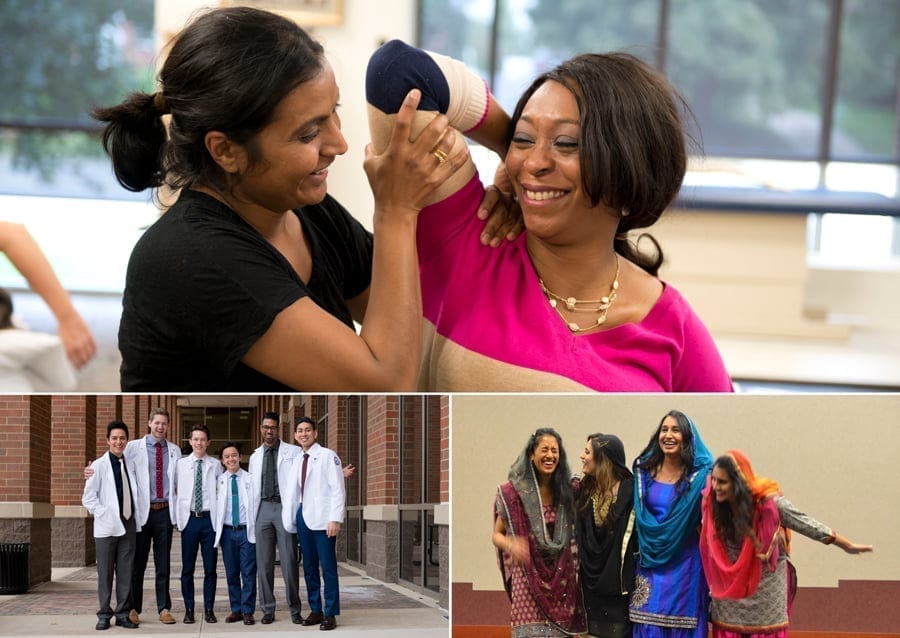From Sports Medicine to Trauma Care, Master It All at DMU
Become a Foot and Ankle Expert With a D.P.M. Degree
Doctors of podiatric medicine treat and care for people from the ground up — in a career that U.S. News and World Report called one of the Top 10 Best-Paying Jobs in 2024.
Because so much of our overall health and function hinges on our feet, ankles and lower limbs, doctors of podiatric medicine have the unique and important opportunity every day to truly impact their patients’ quality of life.
Develop the clinical, communication and interprofessional teamwork skills and experience you’ll need to be a successful podiatric physician through the Doctor of Podiatric Medicine degree program at Des Moines University.
Throughout our four-year graduate program, you will master the skills and knowledge you need to provide top-notch treatment for feet, ankles and lower limbs in pediatrics, surgery, sports medicine, biomechanics, trauma and wound care.
You’ll also be prepared to pass your national board exams and begin your residency in podiatric medicine.

The Future of Health Care Education is Here
Welcome to the new home of Des Moines University.
Quick facts:
Quick
facts
100%
residency placement rate for D.P.M. degree students since 2003
4
years to complete DMU’s doctor of podiatric medicine program
7.5:1
graduate student to podiatric medicine faculty ratio
89.9%
of DMU’s D.P.M. students graduate in 4 years
Doctor of Podiatric Medicine Degree Program Highlights
At DMU, expert faculty members will guide you through the entire D.P.M. degree program, from your first-year basic science courses to your clerkship rotations that will lead to residency opportunities. While working to become a podiatric doctor, you will:
-
Sharpen your skills in state-of-the-art facilities
Throughout our doctor of podiatric medicine program, you will gain a competitive edge over graduate students in other doctor of podiatric medicine degree programs. You will practice and hone your surgical and other clinical skills in our Standardized Performance Assessment Lab, Iowa Simulation Center and Human Performance Lab.
-
Take advantage of graduate research opportunities
Get involved in the Summer Research program or take part in other research opportunities throughout your D.P.M. degree program studies. DMU graduate students who have been involved with research have had articles published in peer-reviewed journals, traveled to meetings across the country to present their research and won prestigious national awards, fellowships and scholarships.
-
Benefit from small class sizes at DMU
Our graduate student-to-faculty ratio is 7.5:1. This means your instructors will be accessible to you inside and outside of the classroom to answer questions, discuss your career trajectory and more.
-
Practice evidence-based medicine
The keystone to our D.P.M. degree program curriculum is small-group, problem-based learning. This will offer you a variety of opportunities to collaborate with fellow med students. You’ll work together to apply the principles of evidence-based medicine and solve clinical cases you may encounter as a podiatric doctor.
-
Double up your graduate degree
If you are enrolled in the clinical programs at DMU, such as the D.P.M. degree program, you may be eligible for a medical dual degree that will lead you to a master of public health, master of health care administration, master of science in biomedical science or master of science in anatomy. This will allow you to combine your clinical knowledge and practice with another specialty area of expertise you’ll gain with a master’s degree.
Through a master’s program, you may enhance your professional and career options by developing management skills; applying what you learn to identify, prevent and resolve public health issues; gaining more experience in medical and scientific research and academic medicine and more.
-
Find community with medical students like you
DMU offers a variety of clubs and interest groups, mission trips, interprofessional activities, service opportunities and more.
Ebonie Vincent, D.P.M.’15, M.B.M.S.
Ebonie Vincent, D.P.M.’15, M.B.M.S., considers podiatric medicine to be the “gem of the specialties” for its impact on patients’ quality of life and flexible practice options for its physicians.
Vincent's enthusiasm helped her land a starring role in the hit TLC show, “My Feet Are Killing Me.” In the show, she and fellow podiatrists Brad Schaeffer and Sarah Haller treat real patients with everything from warts and foot fungus to more complicated and even dangerous conditions. In 2021, the program won an American Reality Television Award for best new cast.
What can you do with a doctor of podiatric medicine degree?
In DMU's D.P.M. degree program, you can specialize in the lower extremities and become a podiatric doctor. But, you will also be knowledgeable in the vascular, surgical, therapeutic, dermatological and other fields of medicine, too. This range of expertise will help you better assess and treat patients in a clinic or hospital setting.
Podiatric Medicine Careers
Des Moines University D.P.M. degree graduates have gone on to:
- Open private podiatrist practices
- Practice in a hospital or clinic
- Teach in an academic setting
From U.S. News and World Report: Podiatrist Among Top 10 Best-Paying Jobs in 2024
Meet your doctor of podiatric medicine faculty
Our D.P.M. degree faculty members have diverse clinical backgrounds, so they bring real-world knowledge and specialized techniques to the classroom. With diverse expertise, they use a variety of teaching methods such as lectures, group projects and labs to prepare you for your boards and residency.
DMU instructors are also experienced researchers with excellent publication track records.
What doctor of podiatric medicine students are saying
“The transition from second to third year is where we actually begin synthesizing and applying what we’ve learned in a clinical setting. It has been an exciting time thus far seeing concepts that were previously just words on a PowerPoint come to life in the clinic and hospital. There is also the newfound challenge of understanding how everything works together, rather than simply regurgitating information for an exam.”
Joshua Treimer, D.P.M.'22
Explore Doctor of Podiatric Medicine Program Courses
DMU’s four-year D.P.M. degree program combines rigorous coursework with diverse lab and clinical experiences using cutting-edge technology. The program’s comprehensive curriculum further prepares you for your career as a podiatric doctor.
At DMU, you will study within a collegial community of med students and faculty members who prioritize service and learning. Our foundational science courses such as anatomy and physiology include grad students in our Doctor of Osteopathic Medicine, Master of Science in Anatomy and Master of Science in Biomedical Sciences programs.
You will also benefit from practice with real-life and realistic scenarios you may encounter in your career:
- Prepare to work alongside others on a health care team in collaborative learning environments such as the classroom and labs.
- Dissect and analyze cadavers; train in suturing, surgical instrumentation, dissection, intravenous insertions and other procedures; practice diagnostic skills and patient care and more.
- Practice patient care in the DMU Foot and Ankle Clinic in your third year in conjunction with clinical rotations in internal medicine, as well as an emergency medicine stimulation rotation, vascular surgery, orthopedics and wound management.
- In your fourth year, you will participate in medical specialty clinical rotations as well as clerkship rotations that lead to residency opportunities.
Graduate Programs Related to Doctor of Podiatric Medicine
Diversity at DMU: Your culture creates ours
Cultural competency is part of the personal and professional development that happens at DMU. Our campus environment is shaped by individuals who bring cultural differences, life experiences and distinct characteristics.


Welcome to campus: See for yourself what we're all about
DMU offers opportunities to get involved in experiences outside the classroom. We are committed to providing a safe and inclusive environment for all our students.
Living in Greater Des Moines: Your new favorite place
Besides being a great place to live and work, the greater Des Moines metro is a vibrant area with communities from all walks of life. Ethnic grocery stores, restaurants and year-round events ensure that there’s always something for everyone.

The Des Moines University College of Podiatric Medicine and Surgery is accredited by the Council on Podiatric Medical Education and the accreditation status is accreditation.
Accreditation is an indication of public approbation, attesting to the quality of the podiatric medical education program and the continued commitment of the institution to support the educational program. The Council is recognized as the professional institutional accrediting agency for podiatric medical education by the U. S. Department of Education and by the Council for Higher Education Accreditation. For further information, please contact the Council on Podiatric Medical Education at the following address: Council on Podiatric Medical Education, 9312 Old Georgetown Road | Bethesda, MD 20814 | 301-571-9200.

















